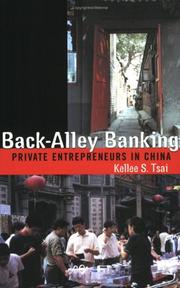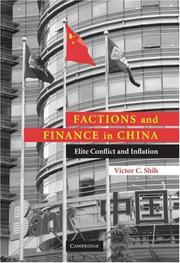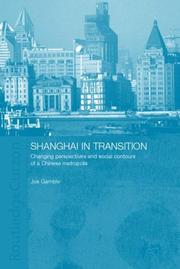| Listing 1 - 10 of 21 | << page >> |
Sort by
|
Book
ISBN: 0804788545 0804787190 9780804788540 9780804787192 Year: 2020 Publisher: Stanford Stanford University Press
Abstract | Keywords | Export | Availability | Bookmark
 Loading...
Loading...Choose an application
- Reference Manager
- EndNote
- RefWorks (Direct export to RefWorks)
Chinese Money in Global Context: Historic Junctures Between 600 BCE and 2012 offers a groundbreaking interpretation of the Chinese monetary system, charting its evolution by examining key moments in history and placing them in international perspective. Expertly navigating primary sources in multiple languages and across three millennia, Niv Horesh explores the trajectory of Chinese currency from the birth of coinage to the current global financial crisis. His narrative highlights the way that Chinese money developed in relation to the currencies of other countries, paying special attention to the origins of paper money; the relationship between the West's ascendancy and its mineral riches; the linkages between pre-modern finance and political economy; and looking ahead to the possible globalization of the RMB, the currency of the People's Republic of China. This analysis casts new light on the legacy of China's financial system both retrospectively and at present—when China's global influence looms large.
Money --- History. --- History --- Australian --- E-books --- S10/0300 --- China: Economics, industry and commerce--Money and banking: general and before 1911

ISBN: 9780801489174 0801489172 0801439280 1501717154 Year: 2004 Publisher: Ithaca Cornell University Press
Abstract | Keywords | Export | Availability | Bookmark
 Loading...
Loading...Choose an application
- Reference Manager
- EndNote
- RefWorks (Direct export to RefWorks)
Chinese entrepreneurs have founded more than thirty million private businesses since Beijing instituted economic reforms in the late 1970s. Most of these private ventures, however, have been denied access to official sources of credit. State banks continue to serve state-owned enterprises, yet most private financing remains illegal. How have Chinese entrepreneurs managed to fund their operations? In defiance of the national banking laws, small business owners have created a dizzying variety of informal financing mechanisms, including rotating credit associations and private banks disguised as other types of organizations. Back-Alley Banking includes lively biographical sketches of individual entrepreneurs; telling "ations from official documents, policy statements, and newspaper accounts; and interviews with a wide variety of women and men who give vivid narratives of their daily struggles, accomplishments, and hopes for future prosperity. Kellee S. Tsai's book draws upon her unparalleled fieldwork in China's world of shadow finance to challenge conventional ideas about the political economy of development. Business owners in China, she shows, have mobilized local social and political resources in innovative ways despite the absence of state-directed credit or a well-defined system of private property rights. Entrepreneurs and local officials have been able to draw on the uncertainty of formal political and economic institutions to enhance local prosperity.
Finance --- Financial institutions --- Informal sector (Economics) --- Banks and banking --- S10/0320 --- China: Economics, industry and commerce--Money and banking: since 1949 --- China
Book
ISBN: 1623200563 9781623200565 1623200008 1336200677 9781623200008 Year: 2015 Publisher: Honolulu Enrich Professional Publishing
Abstract | Keywords | Export | Availability | Bookmark
 Loading...
Loading...Choose an application
- Reference Manager
- EndNote
- RefWorks (Direct export to RefWorks)
Book
ISBN: 1107207169 1282817922 9786612817922 0511775733 0511774974 0511776497 0511773919 0511776969 051177284X 9780511776496 9780511776960 9780521519342 0521519349 1108738400 9780511774973 Year: 2010 Publisher: Cambridge New York Cambridge University Press
Abstract | Keywords | Export | Availability | Bookmark
 Loading...
Loading...Choose an application
- Reference Manager
- EndNote
- RefWorks (Direct export to RefWorks)
"This book examines systematically the current systems of secured lending in China and Hong Kong, where companies or individuals offer personal property as security for credit advanced by a lender. Valid and enforceable security reduces the risk to the lender and so lowers the cost of credit to the borrower. However, the Hong Kong system, being largely derived from English law, is highly complex and in need of root-and-branch reform. The forces of inaction have triumphed and valuable opportunities to create a modern, rational and efficient system have been squandered. In China, on the other hand, a completely new system has been created in the last twenty years which, whilst it has various problems and defects, has some notable advantages over the common law equivalent found in Hong Kong"--
Security (Law) --- Collateral security --- Secured transactions --- Commercial law --- Debtor and creditor --- S08/0350 --- S10/0320 --- China: Law and legislation--General works and codices: since 1949 --- China: Economics, industry and commerce--Money and banking: since 1949 --- Law --- General and Others
Book
ISBN: 1501752405 9781501752407 1501752421 1501752413 9781501752421 9781501752414 Year: 2020 Publisher: Ithaca
Abstract | Keywords | Export | Availability | Bookmark
 Loading...
Loading...Choose an application
- Reference Manager
- EndNote
- RefWorks (Direct export to RefWorks)
"For a very long time, silver was money, but in the late nineteenth century, much of the world adopted some variant of the gold standard. China, however, remained the most populous country still using silver, although the country had no unified national currency; there was not one standard, but many: silver coins circulated alongside chunks of silver and every transaction became an "encounter of wits." This book focuses on how officials, policymakers, bankers, merchants, academics, and journalists in China and around the world answered a simple question: how should China change its monetary system? As different governments in China attempted to create a unified monetary standard in the late 19th and early 20th century, imperial powers--the United States, England, and Japan--tried to shape the direction of Chinese monetary reform for their own benefit. This book argues that the Silver Era in World history ended due to the interaction of imperial competition in East Asia and the state-building projects of different governments in China. When the Nationalist government of China went off the silver standard in 1935, it marked not just a key moment in Chinese history, but in world history"--
Money --- Monetary policy. --- Currency --- Monetary question --- Money, Primitive --- Specie --- Standard of value --- Exchange --- Finance --- Value --- Banks and banking --- Coinage --- Currency question --- Gold --- Silver --- Silver question --- Wealth --- Monetary management --- Economic policy --- Currency boards --- Money supply --- History --- Monetary policy --- Legal tender --- Mints --- Fiat money --- Free coinage --- Scrip --- Currency crises --- Finance, Public --- S10/0300 --- S10/0310 --- S17/1200 --- China: Economics, industry and commerce--Money and banking: general and before 1911 --- China: Economics, industry and commerce--Money and banking: 1911 - 1949 --- China: Art and archaeology--Numismatics --- Gold standard, Silver standard, China in Great Depression, Chinese economic history.
Book
ISBN: 1785609572 9781785609572 1785609580 9781785609589 Year: 2016 Publisher: Bingley, UK
Abstract | Keywords | Export | Availability | Bookmark
 Loading...
Loading...Choose an application
- Reference Manager
- EndNote
- RefWorks (Direct export to RefWorks)
Volume 17 of International Finance Review focuses on a variety of issues relating to the political economy of Chinese finance, including: the pattern of government ownership and control of Chinese firms; the role of government in corporate governance of industrial and financial firms; the interaction of culture, law and institutions in Chinese governance systems; corporate social responsibility, stakeholders and sustainable growth; the effect of political connections on corporate performance and society; privatization, IPOs, exchange listing and firm valuation; the role of government in banking and financial markets; practice of corporate risk management and insurance; foreign-exchange policy and its effect on firms and markets; foreign direct and portfolio investments in China; international investments and operations of Chinese firms; Chinese economic relations with the US and other countries.
Finance --- China --- Economic conditions. --- Politics and government. --- E-books --- S10/0320 --- S10/0420 --- S10/0581 --- China: Economics, industry and commerce--Money and banking: since 1949 --- China: Economics, industry and commerce--Public finance and taxation: since 1949 --- China: Economics, industry and commerce--Management of state enterprises --- Business & Economics --- Finance.

ISBN: 9780521106474 9780521872577 9780511790591 9780511367618 0511367619 9780511366390 0511366396 0511790597 052187257X 1107180767 9781107180765 1281146234 9781281146236 9786611146238 6611146237 0511367023 9780511367021 0511365764 9780511365768 0511573723 9780511573729 0521106478 Year: 2008 Publisher: Cambridge New York Cambridge University Press
Abstract | Keywords | Export | Availability | Bookmark
 Loading...
Loading...Choose an application
- Reference Manager
- EndNote
- RefWorks (Direct export to RefWorks)
The contemporary Chinese financial system encapsulates two possible futures for China's economy. On the one hand, extremely rapid financial deepening accompanied by relatively stable prices are both manifestations of a vigorous growth trajectory that will one day make China the world's largest economy. On the other hand, the colossal store of non-performing loans in the banking sector augurs a troubling future. Factions and Finance in China inquires how elite factional politics has given rise to both of these outcomes since the reform in 1978. The competition between generalists in the Chinese Communist Party and politically engaged technocrats over monetary policies has time and time again prevented inflation from spinning out of control. Shih shows that elite politics has exerted a profound impact on monetary policies and banking institutions in contemporary China.
Banks and banking --- Finance --- Monetary policy --- Government policy --- China --- Politics and government. --- S10/0420 --- S10/0320 --- China: Economics, industry and commerce--Public finance and taxation: since 1949 --- China: Economics, industry and commerce--Money and banking: since 1949 --- Funding --- Funds --- Economics --- Currency question --- Agricultural banks --- Banking --- Banking industry --- Commercial banks --- Depository institutions --- Financial institutions --- Money --- Social Sciences --- Political Science

ISBN: 0700715711 0415861624 1280141751 0203989023 9780203989029 9780700715718 9786610141753 6610141754 9781135790271 1135790272 9781135790318 1135790310 9781135790325 1135790329 9780415861625 9780415861625 Year: 2003 Publisher: London RoutledgeCurzon
Abstract | Keywords | Export | Availability | Bookmark
 Loading...
Loading...Choose an application
- Reference Manager
- EndNote
- RefWorks (Direct export to RefWorks)
In the decades following the introduction of Communist Party rule in Shanghai in 1949, the city's economy, infrastructure and links with the world all atrophied. However, the past decade has seen far-reaching economic reforms implemented to recreate Shanghai as a cosmopolitan, world financial and trade centre. This book focuses on the lives of local residents and their perceptions of their changing city, and presents an evocative series of ethnographic perspectives of the city's shifting sociological landscape in this period of transition.
S03/0633 --- S11/0470 --- S10/0585 --- S10/0590 --- S10/0320 --- China: Geography, description and travel--Shanghai (incl. concessions) --- China: Social sciences--Cities: since 1949 --- China: Economics, industry and commerce--Marketing (including consumption) --- China: Economics, industry and commerce--Distribution --- China: Economics, industry and commerce--Money and banking: since 1949 --- Shanghai (China) --- -Shanghai (China) --- -Economic conditions --- Social conditions --- Shanghai (China) - Economic conditions. --- Shanghai (China) - Social conditions. --- Business & Economics --- Economic History --- Economic conditions. --- Social conditions.
Book
ISBN: 9789004276550 9789004276567 9004276564 9004276556 1322200300 Year: 2014 Publisher: Leiden, the Netherlands Boston Brill Nijhoff
Abstract | Keywords | Export | Availability | Bookmark
 Loading...
Loading...Choose an application
- Reference Manager
- EndNote
- RefWorks (Direct export to RefWorks)
Modern bank insurance is traced to its roots in The Chinese Cornerstone of Modern Banking: The Canton Guaranty System and the Origins of Bank Deposit Insurance 1780-1933 . Frederic Delano Grant, Jr. provides new understandings of the Canton System, collective responsibility for debt at Canton, and the history of deposit insurance. The Canton Guaranty System inspired radical reform in New York in 1829 – the ancestor of all modern deposit insurance. Yet it was never the success imagined, and soon failed. In the Opium War, the Chinese government as implicit guarantor was forced to pay its debts in full on 23 July 1843. The afflictions of the Chinese system, including moral hazard, too big to fail, and unenforced laws, remain familiar today.
S10/0260 --- S10/0300 --- China: Economics, industry and commerce--The Chinese model --- China: Economics, industry and commerce--Money and banking: general and before 1911 --- Deposit insurance --- Suretyship and guaranty --- Banks and banking --- History. --- History --- E-books --- Guaranty --- Principal and surety --- Sureties --- Surety law --- Accessory obligations --- Commercial law --- Liability (Law) --- Security (Law) --- Comfort letters --- Delegation (Civil law) --- Subrogation --- Bank deposit insurance --- Insurance, Deposit --- Savings insurance --- Insurance --- Agricultural banks --- Banking --- Banking industry --- Commercial banks --- Depository institutions --- Finance --- Financial institutions --- Money --- Government guaranty of deposits

ISBN: 0415345170 0415648807 9786610231638 1280231637 0203537033 9781134283262 1134283261 9780203537039 9781134283217 9781134283255 9780415345170 9780415648806 1134283253 Year: 2005 Publisher: London ; New York : RoutledgeCurzon,
Abstract | Keywords | Export | Availability | Bookmark
 Loading...
Loading...Choose an application
- Reference Manager
- EndNote
- RefWorks (Direct export to RefWorks)
China's recent economic reforms have led to impressive growth, and an unprecedented enthusiasm for establishing foreign enterprises in China. Since 1993, China has been the second largest recipient of foreign direct investment in the world and is now considered to be the world's third biggest economy. Its greater economic integration with the rest of the world, especially since its accession to the World Trade Organisation (WTO), has further accelerated its market-oriented economic reforms. China is now opening its protected markets and beginning to submit to the rule of international law. Thi
S10/0251 --- S10/0320 --- S10/0580 --- S10/0700 --- S10/0330 --- China: Economics, industry and commerce--General works and economic history: since 1989 --- China: Economics, industry and commerce--Money and banking: since 1949 --- China: Economics, industry and commerce--Management of enterprises (general, theories) --- China: Economics, industry and commerce--International economic relations (incl. development aid and problems, WTO) --- China: Economics, industry and commerce--Employment --- Industrial policy --- China --- Economic conditions --- Economic policy --- iron --- rice --- bowl --- foreign --- banks --- corporate --- governance --- social --- protection --- chinas
| Listing 1 - 10 of 21 | << page >> |
Sort by
|

 Search
Search Feedback
Feedback About UniCat
About UniCat  Help
Help News
News